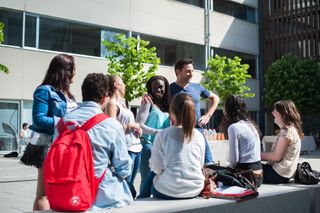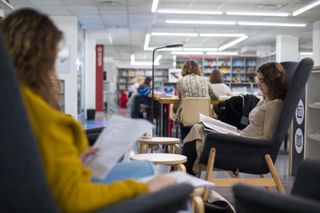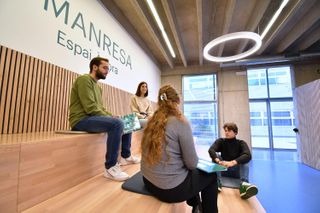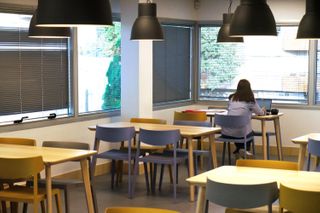- The Student Support Service offers psychological care and individualized occupational therapy to students with emotional, psychological, personal, social and academic difficulties, or with functional diversity
- In the 2022-2023 academic year, UVic-UCC attended to nearly 300 requests from students for some type of support or accompaniment to face the challenges of university
For many young people, the transition to university can generate significant levels of stress and pressure, all the more so in a global context where mental health issues and challenges are the order of the day and where the concept of functional diversity is also at the centre of the debate on inclusion. Addressing the needs that arise in this context, and doing so from the individual reality of each person, is essential to ensure that students perform to their maximum potential and have the best possible university experience. In fact, the right to access education does not end when a student arrives at the school or faculty: instead this is just beginning.
Hence, an inclusive environment must be promoted and tools, resources and action plans must be available for students who need them, adapted to their specific needs. This is what the University of Vic - Universitat Central de Catalunya (UVic-UCC) does through its student support services, which offer psychological care and individualized occupational therapy, and accompany students in any emotional, psychological, personal, social or academic difficulties that they may suffer. The services also support students with functional diversity. This approach helps students to achieve their academic potential, and fosters a culture of diversity and equal opportunities on the University's different campuses.
This approach helps students to achieve their academic potential, and fosters a culture of diversity and equal opportunities
Marta Guimerà, head of the Student Support Service at the UVic Campus, explains that students have several reasons for using the service: "We attend to any kind of difficulty, and we respond to students and other members of the community, mainly teachers, with whom we maintain very close coordination because they ask us for guidelines and advice on how to act in the various situations that they can detect in class".
The importance of mental health in the learning process
Mental health problems have been very prominent in recent years and this has led to a destigmatization process that helps to make them visible and, at the same time, normalizes seeking help to deal with them. One of the consequences has been that, increasingly, educational centres train students in techniques, areas and resources to face personal and social difficulties or to manage emotions, and adapt aspects of their day-to-day life to this new reality.

This attention is carried out individually, considering the specific needs of each person, based on methodologies and resources. The starting point is the sessions held between the professional and the student, which tend to lead to support through more sessions. The University also makes available to students the option of consulting a psychologist, who guides them and, if necessary, refers them to external professionals. In specific cases, a personalized support plan is drawn up, based on a diagnosis, which makes it possible to adapt elements such as being able to leave class when necessary in cases of anxiety.
In specific cases, a personalized support plan is drawn up, based on a diagnosis, which makes it possible to adapt elements such as being able to leave class when necessary in cases of anxiety
Adapting spaces to people
The support provided by the Student Support Service is also aimed at those people who need physical adaptations of spaces to be able to carry out activities easily in the University environment; for example, using materials such as adapted tables or keyboards. Aida Fernández is an occupational therapist and supports students with a recognized disability and those who are going through an illness and, ultimately, need some of these adaptations. Alongside the Student Support Service, other services work to obtain the necessary adapted material. These include UVic's SIRIUS, a leading territorial centre that promotes personal autonomy and improved accessibility, and favours the social integration of people with functional diversity of all ages.

Attention to organization
As Aida Fernández explained,many students come to the service because "it is difficult for them to combine studies, work and leisure time, and their socialization needs remain unsatisfied.” These problems, which in some cases can be the result of attention disorders, can lead to student demotivation and frustration in studies. That is why “in these cases, support is provided to help them with organization, through timetables and objectives to be met,” notes Fernández. By means of this support, which is usually done by establishing a series of short-term objectives and the follow-up that the student deems appropriate, an improvement in the learning process is achieved.
“Many students come to the service because it is difficult for them to combine studies, work and leisure time, and their socialization needs remain unsatisfied”
A recurring demand
During the 2022-2023 academic year, the Student Support Service of the UVic and UMedicina campuses attended to more than 200 student requests. In addition to offering individual tutoring to its students, UManresa services received 30 requests. UElisava, which also offers an individual tutoring service for each student, received 27 requests for psychological attention. The trend continues this year, since at the time of writing this report, 149 people had already been assisted at the UVic and UMedicina campuses, at UManresa 17 requests had been received and at UElisava 16 students had gone to the Psychological Care Service, although it is true that the highest number of requests are received at the beginning of the academic year. The number of visits and requests received shows the need to offer this type of service and attention to students so that they can successfully complete their educational stage at the University.

Testimony:
"I'm at a very important point in my academic career and, although I'm doing things I like, I'm not feeling well mentally and I have self-esteem issues that have led me to seek professional help." This is the testimony of a UVic Campus student who will remain anonymous and who at the beginning of this year went to the UVic Campus Student Support Service for the first time.
After contacting the service through the form on the virtual campus, he had a first session in which he was able to explain his problems. This meeting was the starting point for the creation of a space where he could “describe the problems and, at the same time, find tools to be able to deal with them.” He explained that “the psychologist helped me, but at the same time she made me see that I was the one who had to do the work of overcoming the obstacles.” He concluded, “it helped me gain perspective with some personal problems and so I was able to change some attitudes or, at the very least, identify them to be able to face them.”
He explained that “the psychologist helped me, but at the same time she made me see that I was the one who had to do the work of overcoming the obstacles”

UVic campus
On the campuses of UVic and UMedicina, students can access the >Student Support Service through the website, the email suport.estudiant@uvic.cat or by WhatsApp sent to the phone number +34 646 94 10 26. Once the consultation has been initiated, the service resolves the student's doubts and redirects him/her to the form for requesting an appointment. These are confidential, free sessions, up to a maximum of four per academic year, in which a professional from the service will discuss with the student the issues that concern him/her. The student will be offered the necessary resources and the possibility of a follow-up, if so desired.
In this process, if necessary, an individualized support plan will be developed, and work will be done collaboratively with students to improve their well-being and academic performance. Having a previous diagnosis facilitates the work of the Service and opens the door to access certain forms of help and attention. In addition, this year the Service will promote, as a new feature, training for students so that they learn study techniques, work on topics such as managing emotions or building good self-esteem, or reflect on issues like suicide. There will also be training aimed at teaching and research and administrative and service staff on supporting the well-being of students and a second training session on attention to special educational needs in the classroom.
Campus UManresa
Access to the Student Support Programme (PSE) is through the website, where there are contact emails and instructions on how to access the different services. The Manresa Campus Office of the Vice-Rector coordinates and supervises the PSE, which is divided into three services to respond to learning difficulties, functional diversity and psychological aspects that may affect students on the Campus. These are the Tutorial Action Plan (PAT), which “offers tutorials, individually or in groups, to give advice, information or guidance on everything related to the academic field,” explained Jordi Conca, assistant to the Office of the Vice-Rector; the Support Service for Students with Functional Diversity (SAEDF), which provides “specific support derived from the conditions of functional diversity and/or learning disorders” and which starts from an individualized needs validation process, and the Student Psychological Care Service (SAPE), which is carried out through individualized attention, with three free visits and “meetings to share”, in which students meet to share worries or needs.


UMedicina campus
The Faculty of Medicine offers a student support programme to provide academic and emotional support to students. This programme, which focuses on pedagogical guidance to analyse possible shortcomings in the management and organization of work, has as its central element the tutoring of students. Students can request information through the e-mail suport.estudiant@umedicina.cat. However, the Faculty of Medicine also shares the Student Support Service of the UVic Campus, to which its students have access to solve problems and needs arising from their studies.
Barcelona campus. UElisava
In the case of the Elisava Faculty of Design and Engineering, students have access to a personal service of individual tutors. More specifically, each student has a tutor who accompanies him/her throughout the 4 years of the degree and with whom he/she has an initial meeting, in which possible needs are identified and the extent to which the person wants, can and should receive help from the school or faculty. Students who have difficulties are then followed up by the academic coordination team and the Welfare Officer. At the same time, each student has a coordinator for academic matters, who they can contact if they need support or guidance. Finally, access to a psychologist is facilitated for confidential sessions, if emotional reinforcement is needed. "All this seeks to ensure the well-being of students so that they can be academically successful,” explained Maria Rosario Hernández, head of the Quality area of the Technical Office, responsible for Welfare, and the Equality officer in Elisava.
